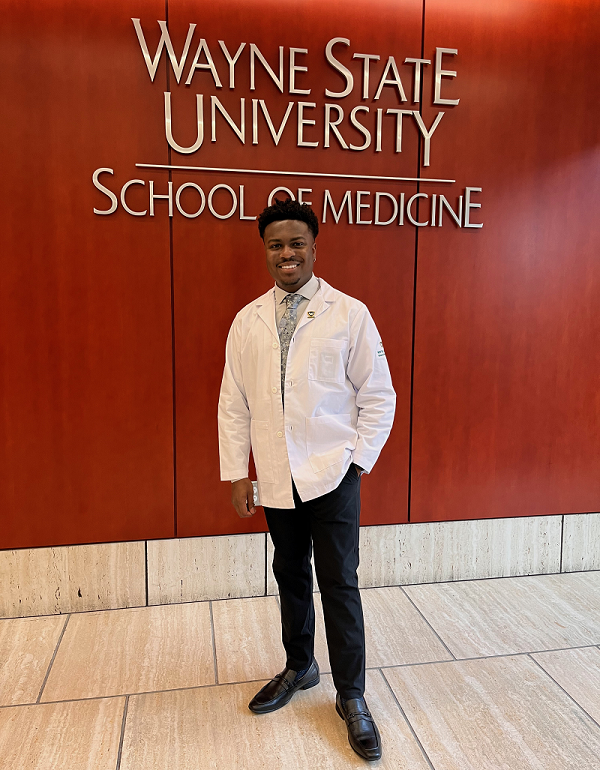Curtis Mack is a member of the Warrior M.D. Class of 2026 who will begin his third year of medical school in March.
The Detroit native is president of the Wayne State University School of Medicine’s Black Medical Association student organization, coordinator of the Otolaryngology Interest Group, inventory co-coordinator of the Street Medicine Detroit student organization, volunteer coordinator of RacquetUp! Detroit, and a board member of the Institutional Justice and Inclusion Committee. He also serves on the Diversity, Equity and Inclusion Committee at the School of Medicine.
Question: Why did you choose Wayne State University for medical school?
Answer: I chose Wayne State because aside from the fact that, I was born and raised in Detroit, I had a deep-seeded connection with my community and I wanted to give back in the best way I know possible—being a physician. Wayne State provides a platform where students are able to help the population of Detroit on a daily basis. The curriculum rivals the best in the country and makes us well prepared for basic medical science, clinical rotations and beyond. Wayne State pushes you out of your comfort zone and encourages you to explore your strengths, ultimately making you a confident leader in every setting you find yourself in—not just the classroom or hospital.
Q: Do you have an idea what specialty you would like to go into yet?
A: I want to keep my options open as far as what specialty I want to go in just to have a fair assessment of them all when I do my clinical rotations. Out of all the specialties I have interacted with so far, I would say Otolaryngology and Anesthesiology are the top of my list. No matter what I choose, I plan to stay in Detroit to practice.
Q: How has your involvement in the Black Medical Association and other affinity groups or events shaped your journey as a medical student/physician in training?
A: Being a part of the Black Medical Association and other diversity/inclusion mission-driven organizations has shaped my experience at Wayne not only as a student leader but also as someone who is conscientious of how our actions can affect future minority students down the road. I have learned that we may not see the benefit of our hard work now, but we are still able to put our best efforts forward for subsequent classes that come in. Nevertheless, working with other passionate student leaders and taking the time to learn from and with them is truly an experience I do not take for granted. I cannot be any more grateful for all of my colleagues on the BMA Executive Board for how diligent and determined they are – carrying out our BMA mission. They are amazing students who realize there is change when we have numbers, cohesiveness, patience and dedication.
Q: Is celebrating/recognizing Black History Month important to you, and if so, why?
A: Celebrating Black History Month is very important to me because we are intentional in pondering the great works of Black history. Black history is substantial and powerful. Taking the time to recognize the giants we stand on keeps us encouraged as medical students, especially when times get a bit rough. We can quickly realize that if it was possible for one, then it’s possible for me, and I am going to do it. Black history is why we continue to have black medical students who are strong, passionate and have a story to tell. Black history to me is a reference point. It is hope, it is motivation and it is my pride.
To suggest a Wayne State University School of Medicine student to spotlight, email Andrea Westfall at gd5273@wayne.edu.